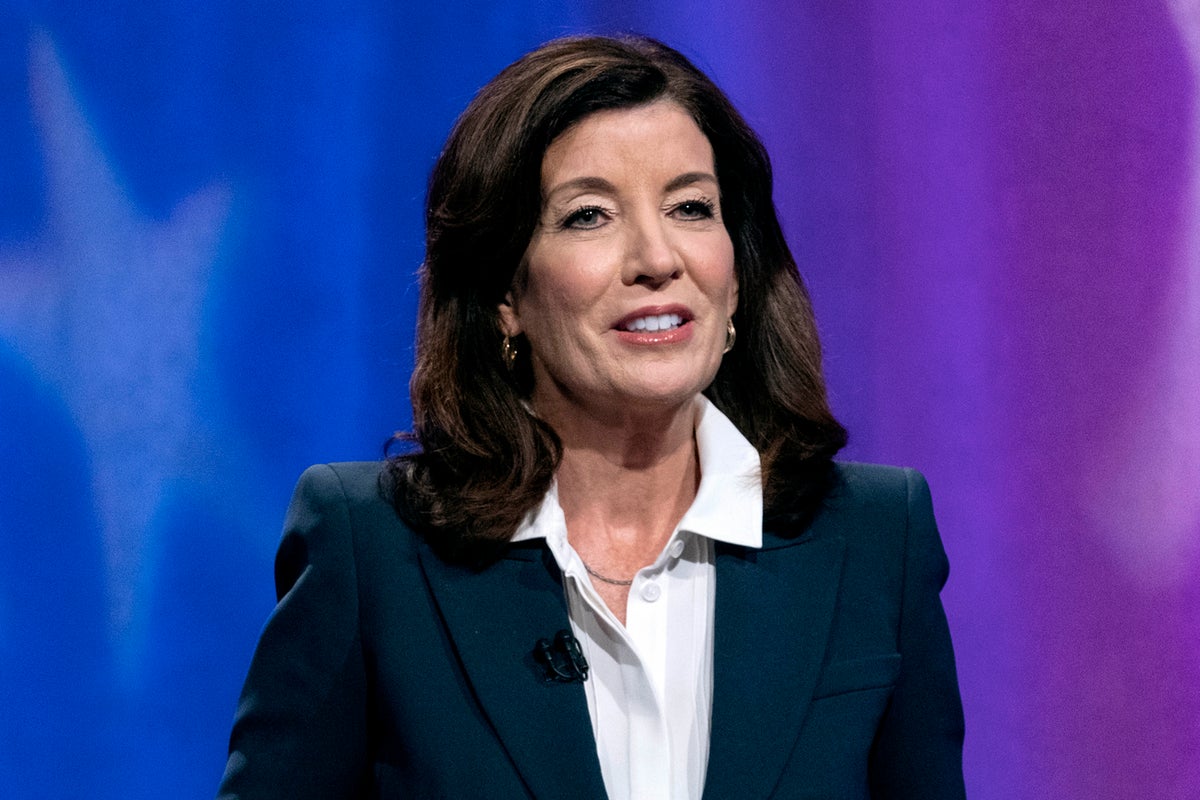
New Yorkers are casting votes in a governor’s race Tuesday that for the first time in a decade does not include the name “Cuomo” at the top of the ticket.
Instead, the most prominent name for Democrats is Kathy Hochul, who was propelled into the governor’s office last year when former Gov. Andrew Cuomo resigned amid sexual harassment allegations.
Hochul is hoping to become the first woman to win election to the New York governor’s office this fall, but first she needs to overcome challenges Tuesday from New York City’s elected public advocate, Jumaane Williams, and U.S. Rep. Tom Suozzi, a moderate from Long Island.
If she wins, Hochul will enter the general election campaign with a big advantage, running as the incumbent with a heavy fundraising advantage in a state that has more than twice as many registered Democrats than Republicans and has not had a GOP governor in 16 years.
Hochul's prospects are expected to be even stronger after the U.S. Supreme Court last week overturned the Roe v. Wade decision establishing abortion rights. She has made bolstering abortion rights a key plank of her campaign, while three of the four candidates on the Republican side are anti-abortion.
The GOP candidates include U.S. Rep. Lee Zeldin, and Andrew Giuliani, the son of New York's former mayor.
Tuesday’s election in New York will cover statewide offices and state Assembly races, but primary elections for U.S. House seats and the state Senate will be held Aug. 23. Those elections were delayed because of a redistricting lawsuit that led a court to throw out new political maps.
Since taking office in August, Hochul has sought to step out from Cuomo's shadow, promising a clean break from his administration. She has said she was not close to the former governor, who has denied wrongdoing, and was not around to witness any alleged misbehavior.
Still, Cuomo’s presence loomed over her campaign early on when he began making public appearances this past spring, criticizing Hochul and Democrats in Albany over their approach to crime and suggesting he might run for his old job. Despite suggesting he might run as an independent, the former governor ultimately did not file to run.
Suozzi, a centrist who has not shied away from embracing Cuomo, was the only Democrat on the debate stage to say he would accept the former governor’s endorsement and said he was still “very popular” despite his “baggage.” He also has echoed Cuomo’s comments calling for Hochul to toughen the state’s bail laws.
Hochul has focused her campaign on steps she took to bolster abortion rights and moves to toughen the state’s gun laws after a racist mass shooting in Buffalo.
Suozzi and Williams have criticized her for her endorsement a decade ago from the National Rifle Association and over her plan to spend more than $1.1 billion in state and county funds on building and maintaining a new stadium for her hometown Buffalo Bills.
She also faced questions about her choice for lieutenant governor, Brian Benjamin, who was arrested on federal corruption charges in April related to his campaign funds.
Benjamin pleaded not guilty and denied wrongdoing. Hochul pointed to the short time frame she had to pick a No. 2 and said she had been assured that any questions previously raised about Benjamin’s campaign fundraising had been resolved.
Suozzi opted to run against Hochul instead of running what was expected to be a tough reelection race for his House seat this year. He made one unsuccessful run for governor before in 2006, but lost the Democratic nomination to Eliot Spitzer.
Williams, the most unabashedly progressive in the race, is often seen wearing a “Stay Woke” button on his lapel. He has been arrested several times for civil disobedience at demonstrations against immigration enforcement and police misconduct.
He serves as a public ombudsman in his role as public advocate and in 2018 put up a surprisingly strong challenge against Hochul in the lieutenant governor’s race, which he lost by 7 percentage points.
If elected, he would be the second Black man to serve as governor after Gov. David Paterson took over in 2007.
The frontrunner in the Republican contest is Zeldin, who has the endorsement of the state’s Republican Party and Conservative Party.
Zeldin, an Army Reserve lieutenant colonel who has represented eastern Long Island in Congress since 2015, is a staunch ally of former President Donald Trump and was among the Republicans who voted against certifying the 2020 election results.
His most high-profile challenger is Andrew Giuliani, the 36-year-old son of former New York City Mayor Rudy Giuliani, who frequently campaigned for his son.
Though Rudy Giuliani was once hailed as a national hero for leading the city through 9/11, he’s become a deeply divisive figure in New York for his work to try to overturn the results of the 2020 election.
The younger Giuliani often repeated his father’s baseless claims that Trump won the 2020 election. Giuliani has never run for public office but worked as an aide in Trump’s White House and then as a commentator on the conservative network Newsmax.
He first gained public attention as a child when he stood next to his father at the elder Giuliani’s 1994 mayoral inauguration, mimicking his gestures and repeating some of his words. His antics as a 7-year-old were parodied by Chris Farley on “Saturday Night Live.”
The other Republican candidates include former Westchester County Executive Rob Astorino, a conservative former radio show host and radio executive, and businessman Harry Wilson, who served as a U.S. Treasury Department advisor under former President Barack Obama. Wilson is the most moderate of the GOP field and was the only candidate of the four Republicans who said he supports abortion rights.







